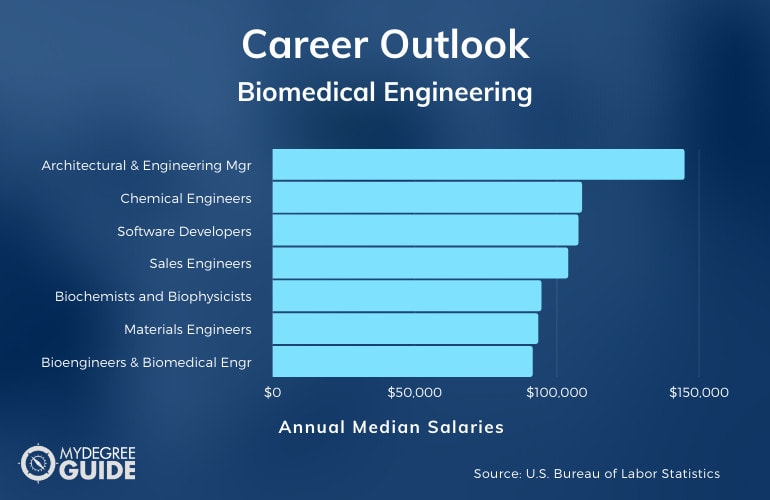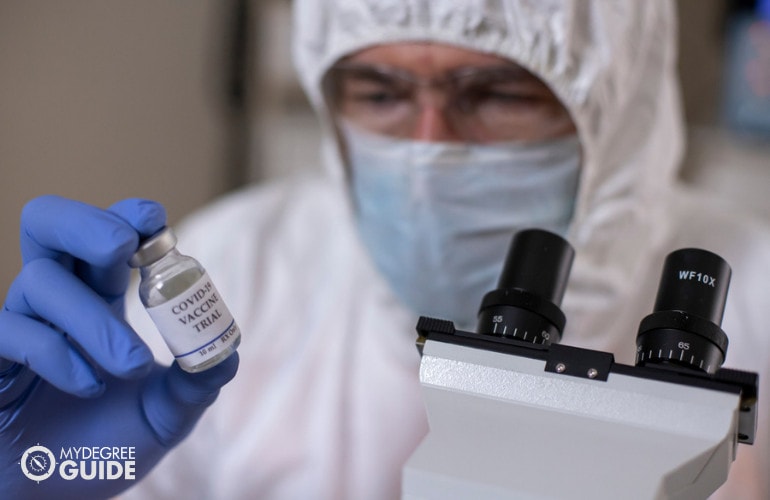If you’re interested in the intersection between engineering and medicine, an online biomedical engineering masters program may be a great fit.

Many employers in the biomedical engineering space prefer candidates with masters degrees over those with bachelors degrees. Whether you want to do laboratory research or design industry-standard medical devices, a masters can help open up multiple doors within the field.
Editorial Listing ShortCode:
Pursuing an online masters degree in biomedical engineering can also help you develop multidisciplinary skills in engineering, the life sciences, and the physical sciences. These skills can be useful across many other domains.
Universities Offering Online Masters in Biomedical Engineering Degree Programs
Methodology: The following school list is in alphabetical order. To be included, a college or university must be regionally accredited and offer engineering degree programs online or in a hybrid format.
Case Western Reserve University
Case Western Reserve University offers an online Master’s in Biomedical Engineering program. To graduate, students must complete 30 credit hours.
Those applying to the program are expected to have completed undergraduate coursework in mathematics, physics, electromagnetics, and chemistry. A minimum 3.0 GPA is required to apply.
Case Western Reserve University is accredited by the Higher Learning Commission.
Colorado State University
Colorado State University offers a Master of Engineering with a specialization in Biomedical Engineering. This online master’s in Engineering program requires students to complete 30 credits to graduate.
Students may also choose to focus on one of three areas: Biomechanics, Materials, and Tissue. Applicants must have a bachelor’s degree in engineering with a 3.0 or higher GPA.
Colorado State is accredited by The Higher Learning Commission, a Commission of the North Central Association of Schools and Colleges.
Columbia University
Columbia University offers an online Master’s in Biomedical Engineering program. To graduate, students must complete 30 credits with a minimum 2.5 GPA within 5 years of starting the program.
Those interested in applying must have an undergraduate degree in engineering or another relevant field with a minimum 3.0 GPA and must have completed the GRE.
Columbia is accredited by the Middle States Commission on Higher Education.
Johns Hopkins University
John Hopkins University offers an online, part-time program for a Master’s in Applied Biomedical Engineering. Students must select one of 5 focus areas: Biomechanics, Imaging, Medical Devices, Neuroengineering, or Translational Tissue Engineering.
To graduate, students must complete 10 courses within 5 years of starting the program. Those interested in the program must have a bachelor’s degree in engineering.
The Johns Hopkins University is accredited by the Middle States Commission on Higher Education.
Purdue University
Purdue University offers an online Master’s in Biomedical Engineering program. Students may choose to follow a thesis or non-thesis path. To graduate, students must complete 30 credit hours with at least 18 credit hours coming from Purdue Engineering courses.
To be eligible, students must hold a bachelor’s degree and submit 3 letters of recommendation.
Purdue University is accredited by the Higher Learning Commission of the North Central Association of Colleges and Schools.
Stevens Institute of Technology
The Stevens Institute of Technology offers an online Master of Engineering in Biomedical Engineering program.
Students may choose one of three focus areas: Biomechanics and Physiology, Bioinstrumentation and Neural Engineering, or Biomaterials and Tissue Engineering. To graduate, students must complete 30 credits with a minimum 3.0 GPA.
Stevens Institute of Technology is accredited by the Middle States Commission on Higher Education.
University of California – Riverside
The University of California—Riverside offers an online Master of Science in Engineering in Biomedical Engineering program. The program can typically be completed in 13 months. Students must complete a total of 32 credits and 4 capstone courses to graduate. To apply, students must have a bachelor’s in engineering and GRE scores.
The University of California – Riverside is accredited by the Western Association of Schools and Colleges.
University of Illinois – Urbana Champaign
The University of Illinois—Urbana Champaign offers an online Master of Engineering in Bioengineering program.
Students may select the Bioinstrumentation concentration to learn more about biomedical imaging. To graduate, students must complete 32 credit hours. Students must have a bachelor’s in engineering or a related field with a minimum 3.0 GPA.
The University of Illinois at Urbana-Champaign is accredited by the Higher Learning Commission.
University of Maryland
The University of Maryland offers an online Master’s in Bioengineering program. The program requires 30 credits to graduate. No thesis or research project is required to graduate.
To apply, students must submit 3 letters of recommendation and have a bachelor’s degree in engineering or a relevant field with a 3.0 GPA.
The University of Maryland is accredited by the Middle States Commission on Higher Education.
University of Southern California
The University of Southern California offers an online Master of Science in Biomedical Engineering program. Students must complete 28 units with a 3.0 GPA to graduate. The program can usually be finished in 2 years. The program can be completed by submitting a thesis or by completing coursework only.
The University of Southern California is accredited by the Western Association of Schools and Colleges, the Senior College and University Commission.
Online Master’s in Biomedical Engineering Programs

Online biomedical engineering graduate programs are strategic for those interested in shaping the future of healthcare technologies. This field depends on a solid understanding of the biological system and fundamentals in mathematics and science.
An online masters in biomedical engineering can help you focus on a particular interest within the field. Regardless of whether you’ve spent some time working in industry, you can cater your program towards further developing in your area of expertise or switch gears altogether to explore a new concentration.
Specific concentration options will vary depending on the program, but some of the most common ones include biomaterials, biomechanics, biotechnology, and bioinformatics. Even more specific areas include neuroengineering and genetic engineering.
Your program can also offer various electives—such as tissue mechanics, biopharmaceuticals, or synthetic biology—to supplement your main concentration.
Some online biomedical engineering masters programs are more geared towards preparing students for biomedical design and product development. These programs will generally require you to complete an internship or capstone project. Other programs that are more focused on academia typically involve lots of research and a final thesis.
Masters program graduates tend to pursue careers as full-time biomedical engineers. Biomedical engineers can work on projects ranging from designing prosthetic limbs to implantable pacemakers. The type of career you can qualify for often depends on your masters program specialization.
Biomedical Engineering Careers & Salaries

The most straightforward path after earning your masters degree is to become a biomedical engineer, but this is far from the only available path. Biomedical engineering is interdisciplinary in nature, and graduates often find themselves working in a mix of different fields.
For example, a bioinstrumentation engineer may specialize in working in image and signal processing in MRI devices, which crosses the boundary into electrical engineering and computer science.
It’s also possible for graduates to move completely into an adjacent field, such as agricultural engineering or materials engineering. According to the Bureau of Labor Statistics, here are median salaries for biomedical engineers and other related fields.
| Careers | Annual Median Salaries |
| Architectural and Engineering Managers | $144,830 |
| Chemical Engineers | $108,770 |
| Software Developers | $107,510 |
| Sales Engineers | $103,900 |
| Biochemists and Biophysicists | $94,490 |
| Materials Engineers | $93,360 |
| Bioengineers and Biomedical Engineers | $91,410 |
| Medical Scientists | $88,790 |
| Agricultural Engineers | $80,720 |
| Environmental Scientists and Specialists | $71,360 |
A masters degree in biomedical engineering could open you up to many adjacent fields, all of which have very competitive salaries.
Besides the attractive pay, the Bureau of Labor Statistics is also optimistic about job prospects for biomedical engineers. They project 5% growth over the next ten years, citing rapid technological advancements and a growing and aging population as some of the major reasons.
Biomedical Engineering Master’s Curriculum

While the field is very broad, individual courses in a biomedical engineering online masters program often focus on very specialized topics.
- Biomaterials: You’ll analyze structural and mechanical functions of tissues in the human body, and you’ll measure host response and performance of various synthetic implants.
- Tissue Engineering: While very similar to biomaterials, tissue engineering focuses more heavily on the design of biological substitutes to replace human tissue functions.
- Orthopedic Biomechanics: This course focuses on the mechanics of the human body, such as analyzing the forces and stresses on bones and joints and applying this to design effective prostheses.
- Biomedical Imaging: You’ll learn about modern biomedical imaging, including topics in image processing and imaging physics, and you may even get hands-on experience operating biomedical instrumentation in labs.
- Biopharmaceuticals: This course gives an overview of topics like drug design, bioconjugate engineering, toxicology, and some of the key shortcomings in modern medicine.
- Synthetic Biology: A combination of multiple science and engineering disciplines, synthetic biology is an introduction to redesigning biological systems found in nature.
- Bioinformatics: A relatively new area of study, bioinformatics combines biology, mathematics, and computer science to analyze biological systems.
- Computational Biology: Similar to bioinformatics, computational biology focuses more on the underlying algorithms and machine learning foundations to develop a deeper understanding of genomic information.
- Neuroengineering: You’ll study human brain functions and neural signal processing and apply these theories to detect signal anomalies and design relevant prosthetics.
- Genetic Engineering: This course gives an in-depth look into techniques and effects of modifying an organism’s genes as well as applications to diagnostics and therapeutic drugs.
These specialized courses draw heavily on foundations in biology, chemistry, mathematics, and engineering. Many courses will generally include substantial projects and experience working with large-scale datasets you are likely to encounter in the industry.
Admissions Requirements

Getting admitted into a masters in biomedical engineering online program may require the following:
- Bachelor’s degree in science or engineering. Because much of the curriculum will build on foundational topics in science and engineering, a bachelor’s degree in a related field is recommended, if not required.
- GRE or GMAT scores. Some schools are starting to mark the GRE or GMAT as optional, so it may not be a strict requirement for your program.
- Recommendation letters. You may be required to provide recommendation letters that exemplify your past research accomplishments or industry experience.
In addition to these criteria, having a high GPA in previous coursework can boost your chances of admission.
Accreditation

When browsing potential programs, you may want to focus on ones that have been regionally accredited by a reputable organization, such as the organizations recognized by the Council for Higher Education Accreditation (CHEA).
Attending a regionally accredited institution can help give you the assurance that you’re getting a top-notch education. Because a school’s accreditation status expires periodically, consistent accreditation shows the school’s dedication to maintaining and improving their educational programs over time.
Another important point of accreditation is that it can determine eligibility for multiple forms of financial aid, including federal student assistance or employer tuition reimbursement programs.
Financial Aid and Scholarships

There are many places to look for financial aid and scholarships to help you pay for an MS in Biomedical Engineering online program. If you are currently in industry, your employer may have programs dedicated to supporting partial or full tuition assistance.
In addition, some companies arrange for their employees to continue working part-time as they pursue a degree. This method offers a way to pay for school and allows you to continue gaining industry experience while doing so.
You can also explore federal and state aid programs. One of the most common ways to apply for financial aid is by submitting an application form through the official Federal Student Aid website.
There are also bioengineering and biomedical organizations that offer scholarships. Scholarships don’t have to paid back, unlike loans. Most scholarships are merit-based and may require you to submit an essay, report card, or letter of recommendation for consideration.
Professional Biomedical Engineering Organizations

Joining a professional biomedical engineering organization can be a great way to network with peers and professionals in the field.
- American Institute for Medical and Biological Engineering (AIMBE)
- Biomedical Engineering Society (BMES)
- International Federation for Medical and Biological Engineering (IFMBE)
Networking is a crucial aspect in any industry. Beyond online forums and articles, these organizations may also arrange professional or social events to help you form meaningful connections that can last beyond your program.
What Does a Biomedical Engineer Do?

Biomedical engineering is fairly broad. Depending on your specific interests and program concentration, typical roles may involve designing artificial body parts, developing new forms of drug therapies, or operating and developing biomedical equipment.
The Bureau of Labor Statistics provides a list of career paths within biomedical engineering. These careers include bioinstrumentation engineers, biomaterials engineers, biomechanics engineers, clinical engineers, and rehabilitation engineers.
Also, since biomedical engineering overlaps with many related fields, some graduates may pursue work in areas such as chemical engineering, materials engineering, and software engineering.
How Much Does a Biomedical Engineer Make?

According to the Bureau of Labor Statistics, the median salary for a biomedical engineer is $91,410, with the top 10% earning more than $148,210. These salaries are general figures that apply across the entire field of biomedical engineering.
Specific industries, such as those related to manufacturing navigational, electromedical, and control instruments post median salaries of $105,720. Other industries, such as those involving medical equipment and supplies manufacturing, have a slightly lower median salary of $89,400.
How Hard Is Biomedical Engineering?
Biomedical engineering is a field that requires a solid understanding of biology, chemistry, engineering principles, and modern medicine, among other topics. Because of its interdisciplinary nature, biomedical engineering is often considered one of the harder professions to break into.
When earning a biomedical engineering masters degree, it can help if you’re naturally inclined in these various disciplines. Being committed and passionate about the future of healthcare technologies are other factors that may help you advance in your studies.
What Can You Do with a Masters in Biomedical Engineering?

After earning a masters degree in biomedical engineering, many graduates choose to go directly into industry. Common areas include biomaterials engineering or biomechanics engineering as well as management positions under these fields.
Many graduates also choose to work as clinical engineers, who are more involved with day-to-day operations of a hospital. Others prefer to work in offices or labs, researching and designing medical devices as biomaterials engineers.
A masters in biomedical engineering can also help equip you for a variety of positions in related fields, such as software engineering and materials engineering.
What’s the Difference Between Bioengineering vs. Biomedical Engineering?

While both of these fields operate in similar spaces, bioengineering is considered the more general of the two.
- Bioengineering: Bioengineering applies engineering principles to many areas that biomedical engineering doesn’t cover, such as agriculture, food, and the environment.
- Biomedical engineering: This is a specific area of bioengineering that focuses on methods to improve human health.
In short, much of the work you’ll encounter in biomedical engineering has to do specifically with healthcare while bioengineering covers a wider range of topics within biology.
Is a Masters in Biomedical Engineering Worth It?

Yes, a masters in biomedical engineering is worth it for many students. As technology continues to advance rapidly, so will its applications to medicine and healthcare.
In addition, as medicine continues to make strides, engineers who specialize in the technologies that support this growth may be increasingly sought after.
The Bureau of Labor Statistics expects 1,400 job openings for biomedical engineers each year over the next decade. With a positive job growth of 5%, employment for these occupations is growing slightly faster than average.
Getting Your Biomedical Engineering Masters Online

If you’re passionate about the future of medicine and healthcare technologies, you may want to consider pursuing a biomedical engineering masters online.
In addition to the many technical skills you can develop, you’ll also receive an overview of the problems facing biomedical industries today, putting you at the forefront of the next generation of medicine.
Together with peers and professionals you’ll meet throughout the program, you may become well-equipped to tackle these issues and contribute to the future of human health. You can start this journey today by researching accredited programs that cater to your interests in biomedical engineering.
